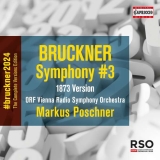Von Anton Bruckners 3. Symphonie dirigiert Markus Poschner die Originalfassung von 1873. Es ist eine kontrastreiche Interpretation, die das Geflecht der Motive klar herausstellt und uns so beeindruckend die Architektur der vieldimensionierten Gedankenwelt des Komponisten vor Ohren führt. Rasche und forsche Tempi, bis zur Atemknappheit, und dynamische Unterschiede, die erstaunen, sowie eine schroffe Gestik charakterisieren den ersten Satz und damit Bruckners Gefühl innerer Unsicherheit, das sich im Adagio fortsetzt. Dieses gestaltet Poschner nicht nur feierlich und gefühlvoll gestaltet, sondern er bringt ebenfalls das Konfliktuelle des Satzes zum Ausdruck.
Diese oft radikalen Klangvorstellungen kommen natürlich dem Perpetuum mobile des Scherzo zugute, doch schafft es der Dirigent nicht, dem Trio seine Ländler-Atmosphäre zu geben. Prachtvoll ist das finale Allegro, das Poschner mit eiserner Konsequenz vorantreibt.
Das Orchester erledigt sich seiner Aufgabe sehr gut, und die Tonaufnahme ist räumlich und hat eine dem Werk angepasste Tiefe.
Markus Poschner conducts the original 1873 version of Anton Bruckner’s 3rd Symphony. It is an interpretation rich in contrasts that clearly brings out the mesh of motifs, impressively presenting us with the architecture of the composer’s multi-dimensional world of thought. Rapid and brisk tempi, to the point of breathlessness, and dynamic differences that astonish, as well as abrupt gestures, characterize the first movement and with it Bruckner’s sense of inner uncertainty, which continues in the Adagio. Poschner not only shapes this solemnly and sensitively, but he likewise expresses the movement’s sense of conflict.
These often radical sonorities naturally benefit the perpetuum mobile of the Scherzo, but the conductor fails to give the Trio its Ländler atmosphere. The final Allegro which Poschner drives forward with consistency is truly exciting.
The orchestra plays very well, and the sound recording is spacious and has depth appropriate to the work.
























